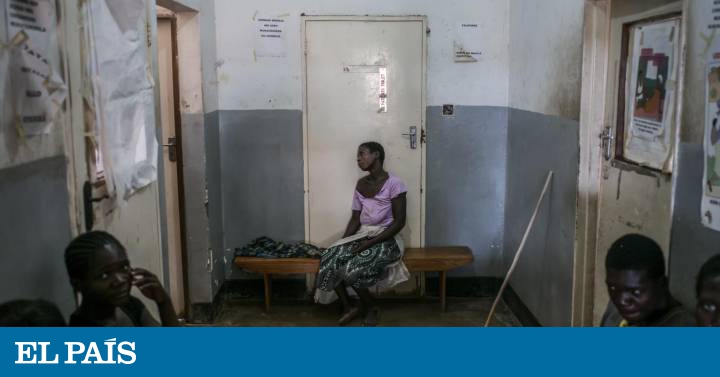Efforts to fight AIDS in Africa can go back more than a decade if the continuity of HIV prevention and treatment services is not guaranteed during the new coronavirus pandemic. Specifically, a six-month interruption in the supply of antiretroviral therapy may mean an increase of 500,000 deaths in the sub-Saharan region between 2020 and 2021 due to diseases related to AIDS, such as tuberculosis, among others, according to a statement published this Monday by the World Health Organization and the United Nations agency for the fight against AIDS (UNAIDS).
MORE INFORMATION
Everything that the coronavirus is going to stop: the fight against the epidemics that kill the most- Coronavirus: what you should know if you have HIV, diabetes or tuberculosis
- Latest news of the coronavirus in Africa
"The terrible possibility that half a million more people in Africa will die of AIDS-related diseases is like going back in history," explained WHO Director-General Dr. Tedros Adhanom Ghebreyesus, who has asked communities and the organization's partners to take action now.
If this situation occurs, it would be a tragic record since 2008, when 950,000 people died of AIDS in the region. In 2018, the year for which the latest statistical data is available, 25.7 million people were carriers of HIV in sub-Saharan Africa, of which 16.4 million were receiving antiretroviral treatment. These people are at risk of having their treatment interrupted due to the closure of the health services that provide it or because they are focused on supporting the response to covid-19 to the detriment of other therapies, such as that required for HIV carriers. .
"We should read this as a wake-up call to countries to identify ways to keep all health services vital. For HIV, some countries are already taking important steps - for example, ensuring that people can collect treatment packages in bulk and other essential products, including self-assessment kits, from delivery points. This would ease pressure on health services and the health workforce. We must also ensure that global supplies of tests and treatments continue to flow to countries they need them, "he added.
"The pandemic should not be an excuse to divert investment in HIV eradication. There is a risk that hard-earned gains will be sacrificed in the fight against covid-19, but the right to health means that no disease it must be fought at the expense of the other, "added Winnie Byanyima, executive director of UNAIDS.
25.7 million people were HIV carriers in sub-Saharan Africa in 2018
When a patient follows treatment well, her HIV viral load falls to an undetectable level, keeping her healthy and preventing transmission of the virus. But if that person is unable to take antiretroviral therapy regularly, the viral load will increase, which will affect their health and ultimately lead to death. Even short-term treatment interruptions can have a significant negative impact on a person's health and virus transmission potential.
The research used various mathematical models to analyze the effects of possible interruptions in HIV testing, prevention and treatment services caused by covid-19. Each model analyzed the potential impact of three-month or six-month treatment interruptions on AIDS mortality and HIV incidence in sub-Saharan Africa.
In the six-month outage scenario, excess AIDS-related deaths in one year were estimated to range from 471,000 to 673,000, far from the goal set by the United Nations for 2030 on the Sustainable Development Goals to reduce the figure less than 500,000 deceased.
If there is a three-month interruption, the impact will be small but still significant. Sporadic interruptions in antiretroviral therapy delivery will lead to also sporadic adherence to treatment, leading to increased drug resistance and there will be long-term consequences for future treatment success.
Fear of increased mother-to-child transmission
Disruption of services could also reverse the progress made in eliminating mother-to-child transmission of HIV. Since 2010, new HIV infections in children in sub-Saharan Africa have decreased by 43%, from 250,000 in 2010 to 140,000 in 2018, due to the high coverage of HIV services for mothers and their children in the region. Reducing these by covid-19 for six months could dramatically increase new childhood HIV infections, by up to 37% in Mozambique, 78% in Malawi and Zimbabwe, and 104% in Uganda.
Other significant effects of the pandemic on the AIDS response in sub-Saharan Africa that could lead to additional mortality include a decrease in the quality of clinical care due to health centers becoming too saturated and the possible suspension of tests to detect the viral load.
"Every death is a tragedy. We cannot sit back and allow hundreds of thousands of people, many of them young, to die unnecessarily. I urge governments to ensure that all men, women and children living with HIV get regular supplies of antiretroviral therapy - it's literally life-saving, "Byanyima added.
Each scenario studied also considered to what extent an interruption of preventive services, including suspension of voluntary male medical circumcision, interruption of condom availability and suspension of HIV testing would affect the incidence of the virus in the region.
The communiqué highlights the need for urgent efforts to guarantee the continuity of HIV prevention and treatment services in order to avoid excess deaths related to this disease and avoid increasing its incidence during the pandemic.
You can follow FUTURE PLANET on Twitter and Facebook and Instagram, and subscribe here to our newsletter.

